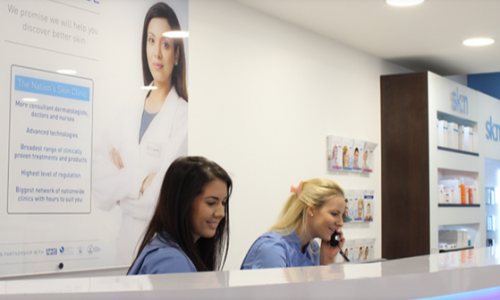What You Need To Know About Tattoo Removal Aftercare

Medically Reviewed June 2023, by Charlotte Tundy, Regional Nurse Trainer, for sk:n. Next review due June 2024.
Whether you’re planning on getting your tattoo lasered off, or you have just completed your first treatment, it’s essential to understand the healing and aftercare process. Read on to learn more.
How does tattoo removal work?
Laser treatments can be used to safely and gradually remove unwanted tattoos. Tattoo ink can be broken down into small particles by these high-tech lasers, which pass through the skin and it can then be eliminated by the body’s immune system.
While more specialised lasers may be required for multicoloured tattoos, sk:n offers the innovative Pico, which precisely targets undesired pigment for even faster healing and shorter recovery time.
View this post on Instagram
Tattoo removal healing process
After your laser tattoo removal procedure, you might expect some redness, swelling, mild blistering, itching, and raised areas. This is to be expected. At first, the skin will be very sensitive and tender. These reactions to treatment should fade within two weeks.
The affected area will be red, puffy, and itching following removal, and is likely to continue for the next week or so. Many clients report that they feel fine after the procedure. The laser treatment is visible, but it hasn’t interfered with their day-to-day activities.
Immediately following laser removal, the tattooed skin may seem “frosted,” giving it a powdery appearance. This is a perfectly natural side effect that is caused by the skin releasing carbon dioxide. After laser removal, patients may have this reaction for up to an hour. Your specialist should be contacted if it takes longer.
After the first day of recovery, the look of the area can alter as your body continues to adjust to the laser treatment. Again, these side effects are very common, but you should talk to your laser technician about any worries you have so that you can feel secure.
During the first week after the laser treatment, the body will continue to remove and digest the ink. During this step of tattoo removal, your skin will begin to heal. As a result, it will likely remain red and swollen for the first several days, which is quite normal.
This process will continue throughout each laser session until the tattoo is fully removed.
Tattoo removal aftercare tips
The better your immune system is, the more quickly your skin will recover. A well-functioning immune system aids in wound healing and infection resistance.
It’s possible to notice results more quickly if you do the following things:
- Drink a lot of water: One of the most important aspects of having a healthy immune system is being properly hydrated. A healthy immune system is made possible by the removal of toxins from the body and the regeneration of blood cells.
- Reduce your alcohol intake: Dehydration from excessive alcohol use might impede the healing process. If you can, steer clear of alcohol all together.
- Limit smoking: Your immune system has to work harder when you smoke to get rid of the toxins in the air and this slows down your skin’s healing process. Patients who abstain from smoking have better outcomes and require fewer sessions.
- Exercise: When you exercise, your heart pumps more blood through your body. The ink molecules in your skin are broken down by increased blood flow. After your treatment, you should take several days off from working out. Physical exercise, on the other hand, can speed up the removal of tattoos after the skin has healed and scabbed over.
Find your nearest clinic and arrange a free consultation with one of our trusted dermatologists for advice on how tattoo removal can work for you.
Related Articles

08
Apr 2024

08
Apr 2024
Request a callback
One of our friendly sk:n advisors will call you to book your consultation.
- More than 450 consultants, doctors, nurses and medical practitioners
- Regulated by the Care Quality Commission, Health Inspectorate Wales and Health Improvement Scotland
- Partner of the NHS
- Rated excellent by our clients on Trustpilot
- Strict safety and care protocols




